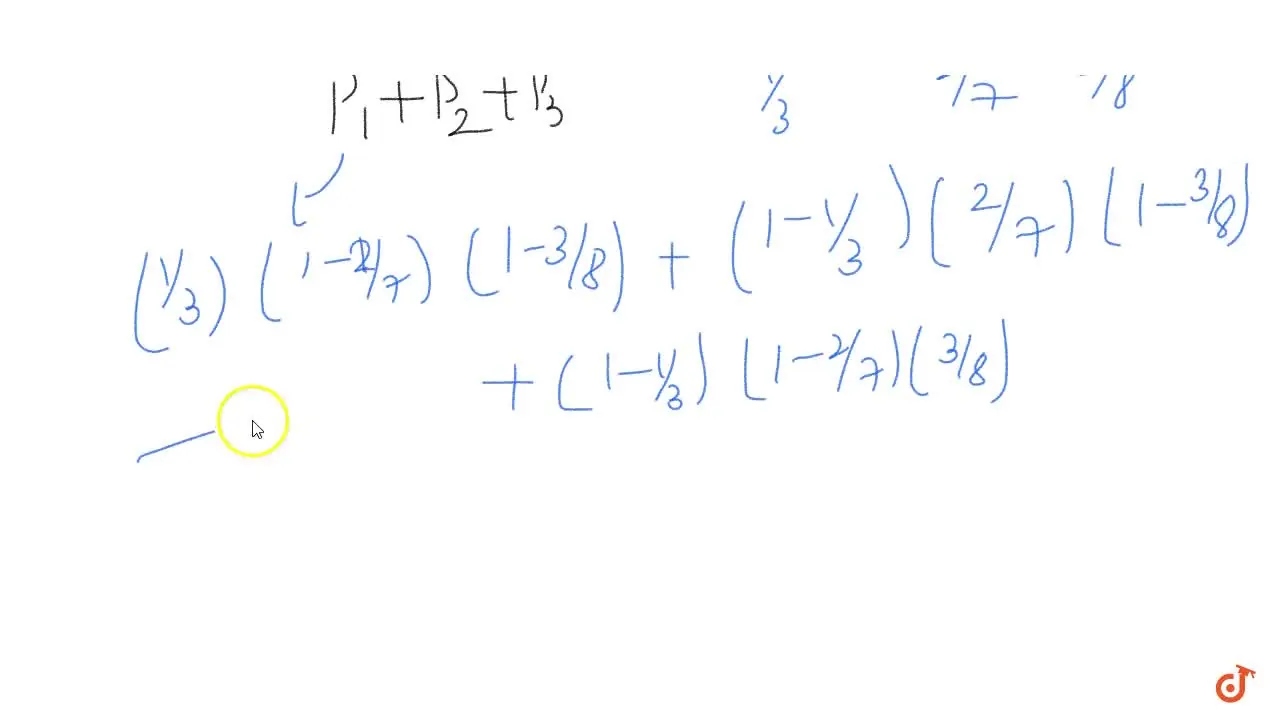The probabilities of A, B and C solving a problem are 1/3, 2/7 and 3/8 respectively. If all the thee try to solve the problem simultaneously, find the probability that exactly one of them can solve it.
Probability any one of A, B or C can solves it
= probability of A solving (rest fail) + probability of B solving (rest
fail) + probability of C solves (rest fail)
=P(A)×P(BC)×P(CC)+P(AC)P(B)P(CC)+P(AC)P(BC)P(C)
=(13)(1−27)(1−38)+(1−13)(27)(1−38)+(1−13)(1−27)(38)
=13×57×58+23×27×58+23×57×38
⇒25168+20168+30168⇒75168⇒2556
probability that exactly any one of A, B, Cwill solve is 2556
Related Playlists
Similar Questions
Using Lagranges mean value theorem, show that sin⟨xforx⟩0.
02:24View SolutionAn integer m is said to be related to another integer n if m is a multiple of n . Check if the relation is symmetric, reflexive and transitive.
05:43View SolutionProbability of solving specific problem independently by A and B are 12and 13respectively. If both try to solve the problem independently find the probability that(i) the problem is solved (ii) exactly one of them solves the problem.
View SolutionThe probalities of A, B, C solving a problem are ⅓, ¼ and .1/6 respectively. If all the three try to solve the problem simultaneously, find the probability that exactly one of them will solve it.
09:09View SolutionProbability of solving specific problem independently by A and B are 12 and 13 respectively. If both try to solve the problem independently, find the probability that :
(i) the problem is solved
(ii) exactly one of them solves the problem.02:32View SolutionProbability of solving specific problem independently by A and B are and 12 and 13 respectively. If both try to solve the problem independently, find the probability that
i. the problem is solved
ii. exactly one of them solves the problem04:13View SolutionIf rs. 2800 is 2/7th of the value of a house, the worth of the house in rs. is?
03:41View SolutionProbabilities of solving a specific problem independently by A and B are 12 and13 respectively. If both try to solve the problem independently, find the probability that (i) the problem is solved (ii) exactly one of them solves the problem.
03:39View SolutionProbability of solving specific problem independently by A and B are 12 and 13 respectively. If both try to solve the problem independently, find the probability that (i) the problem is solved (ii) exactly one of them solves the problem.
04:15View SolutionThe probabilities of A, B and C solving a problem are 1/3, 2/7 and 3/8 respectively. If all the thee try to solve the problem simultaneously, find the probability that exactly one of them can solve it.
05:27View SolutionProbabilities of solving a specific problem in dependently by A and B are 12and13 respectively. If both try to solve the problem independently find the probability that : The problem is solved Exactly one of them solves the problem.
04:12View SolutionProbability of solving specific problem independently by A, B and C are 37,13and25 respectively. If all of them try to solve the problem independently then find the probability that problem will be solved.
04:41View SolutionProbabilities of A, B and C of solving a problem are 12,13and14 respectively. If they all try to solve the problem then find the probability that exactly one of them will solve the problem.
04:55View SolutionProbabilities of A, B and C of solving a problem are 14,13and15 respectively. If they all try to solve the problem then find the probability that exactly one of them will solve the problem.
03:41View Solutionएक विशेष समस्या को A और B द्वारा स्वतंत्र रूप से हल करने की प्रायिकताएं क्रमशः 12 और 13 हैं। यदि दोनों स्वतंत्र रूप से समस्या हल करने का प्रयास करते हैं। तो प्रायिकता ज्ञात कीजिए कि
(i) समस्या हल हो जाती है
(ii) उनमें से तथ्यतः कोई एक समस्या हल कर लेता है।03:41View Solution


